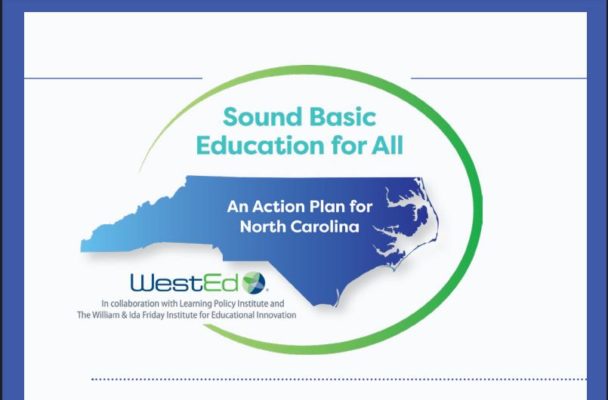North Carolina Democrats push for education reform

The Leandro Report primarily aims to address eight critical needs of the North Carolina education system to improve academic outcomes for students. Image by EducationNC
By Nicholas Bainbridge
News Editor
Education is an important issue for the state government of North Carolina, as section 15 of Article 1 of the North Carolina Constitution holds, “The people have a right to the privilege of education, and it is the duty of the State to guard and maintain that right.”
Criticism has been levied against the government of North Carolina that it has faltered in its self-imposed obligation to provide education to its residents. Beginning in 1994, a series of court cases exposed instances in which multiple schools were unequipped to provide education to students in their district, often due to insufficient resources.
Legislators have been investigating this issue for a while, and in 2019, a bipartisan investigation into the education systems, and their failings, developed into the Leandro Report. The Leandro Report is a series of initiatives that would restructure the management of the North Carolina education system, in an effort to resolve the failings of the current system.
While it arose from a bipartisan investigation, the plan’s implementation, detailed in the Leandro Report, is a Democrat effort and has yet to receive major Republican support. Legislative leadership has, so far, refused to have a hearing to discuss whether or not the plan should be implemented.
Ashton Clemmons, one of the six representatives for Guilford County in the North Carolina House of Representatives, is one of the legislators pushing for the implementation of the Leandro Report. She engaged with the Campus Chronicle in an interview to answer various questions regarding the plan and the efforts to have it passed.
Many of the proposed changes outlined in the report involve redistributing state funding so that schools have the necessary resources to educate their students. The investigation into the failings of the state education system revealed schools that should, when using the metrics of population and size, receive the same amount of funding often receive varying amounts of financial support.
The schools that receive less funding, consequently, are lesser-equipped to provide for students than others that should be on par with them. The reasons for this are tied to how schools receive their financial support.
“Local jurisdictions pull from the local area for funding, so poorer areas have less funding,” Clemmons said. “Schools in our needier areas have less to work with, as the residents have lower incomes.”
The financial resource problems that the Democrats are seeking to solve do not end with just schools, but they also extend to the amount of money spent on special-needs children. Clemmons explained that, under the current system, the amount of money spent on many special-needs children, whom she refers to as “exceptional children,” is incorrectly determined.
“Different children with different needs have different levels of funding,” Clemmons said. “But in North Carolina, we fund exceptional children at the same amount, regardless of the difference in needs. A child that needs speech therapy gets the same amount of money as a child that needs nurses taking care of them all day.”
This circumstance inevitably leads to children with greater needs receiving less financial aid than they require, while potentially resulting in situations where an excess of funds are given to children whose needs would be met with less financial support. Proponents of the Leandro Report argue that reshaping the way funds are assigned to special-needs students will allow them to solve this issue.
The Leandro Report calls for substantial increases in the amount of funds dedicated to the public school system. At the time of her interview with Campus Chronicle, Clemmons explained that plans were not finalized on where the additional funds would be drawn from, as state budgets and revenues are still being reviewed.
One of the primary changes that the plan will have for schools is increasing the number of staff in each institution.
“There would be an immediate increase in the support staff of our schools, including school nurses, counselors and janitors,” Clemmons said. “Some schools don’t have access to enough support staff or only have them some days. In my child’s school, they only have a nurse half of the time because they can’t afford to have her every day.”
Clemmons also explained that if college students are interested in this issue and want to help the topic reach the floor of the House of Representatives for a hearing, they can inform people of the issues facing the North Carolina public education system and the proposed solutions outlined in the Leandro Report.
The Leandro Report is publicly available for anyone to read online at NCPolicywatch.org.